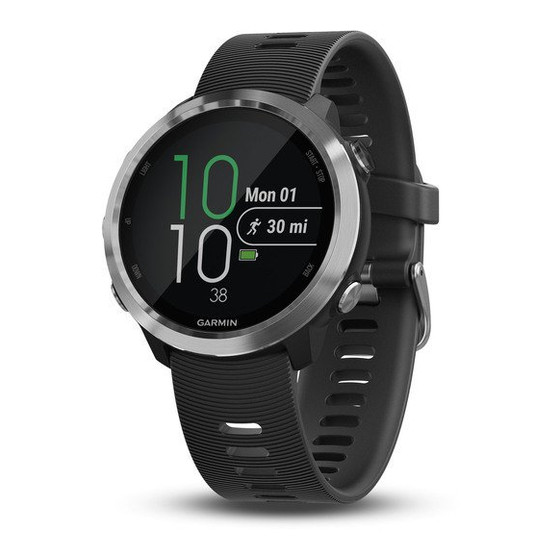Garmin FORERUNNER 645 Manual do Proprietário - Página 31
Procurar online ou descarregar pdf Manual do Proprietário para Ver Garmin FORERUNNER 645. Garmin FORERUNNER 645 38 páginas.

• Use a Connect IQ watch face that is not updated every
second.
For example, use a watch face without a second hand
(Customizing the Watch Face, page
• Limit the smartphone notifications the device displays
(Managing Notifications, page
• Stop broadcasting heart rate data to paired Garmin devices
(Broadcasting Heart Rate Data to Garmin
• Turn off wrist-based heart rate monitoring
Wrist Heart Rate Monitor, page
NOTE: Wrist-based heart rate monitoring is used to calculate
vigorous intensity minutes and calories burned.
The temperature reading is not accurate
Your body temperature affects the temperature reading for the
internal temperature sensor. To get the most accurate
temperature reading, you should remove the watch from your
wrist and wait 20 to 30 minutes.
You can also use an optional tempe external temperature
sensor to view accurate ambient temperature readings while
wearing the watch.
How can I manually pair ANT+ sensors?
You can use the device settings to manually pair ANT+ sensors.
The first time you connect a sensor to your device using ANT+
wireless technology, you must pair the device and sensor. After
they are paired, the device connects to the sensor automatically
when you start an activity and the sensor is active and within
range.
1
Stay 10 m (33 ft.) away from other ANT+ sensors while
pairing.
2
If you are pairing a heart rate monitor, put on the heart rate
monitor.
The heart rate monitor does not send or receive data until
you put it on.
3
Hold UP.
4
Select Settings > Sensors and Accessories > Add New.
5
Select an option:
• Select Search All.
• Select your sensor type.
After the sensor is paired with your device, a message
appears. Sensor data appears in the data page loop or a
custom data field.
Can I use my Bluetooth sensor with my
watch?
The device is compatible with some Bluetooth sensors. The first
time you connect a sensor to your Garmin device, you must pair
the device and sensor. After they are paired, the device
connects to the sensor automatically when you start an activity
and the sensor is active and within range.
1
Hold UP.
2
Select Settings > Sensors and Accessories > Add New.
3
Select an option:
• Select Search All.
• Select your sensor type.
You can customize the optional data fields
Data Screens, page
20).
My music cuts out or my headphones do not
stay connected
When using a Forerunner 645 Music device connected to
headphones using Bluetooth technology, the signal is strongest
Appendix
22).
1).
Devices, page
®
(Turning Off the
9).
(Customizing the
when there is a direct line of sight between the device and the
antenna on the headphones.
• If the signal passes through your body, you may experience
signal loss or your headphones may become disconnected.
• It is recommended to wear your headphones with the
antenna on the same side of your body as your
Forerunner 645 Music device.
9).
Data Fields
Some data fields require ANT+ accessories to display data.
%HRR: The percentage of heart rate reserve (maximum heart
rate minus resting heart rate).
24-Hour Max.: The maximum temperature recorded in the last
24 hours.
24-Hour Min.: The minimum temperature recorded in the last
24 hours.
Aerobic TE: The impact of the current activity on your aerobic
fitness level.
Anaerobic TE: The impact of the current activity on your
anaerobic fitness level.
Average HR: The average heart rate for the current activity.
Average Pace: The average pace for the current activity.
Average Swolf: The average swolf score for the current activity.
Your swolf score is the sum of the time for one length plus
the number of strokes for that length
page
3). In open water swimming, 25 meters is used to
calculate your swolf score.
Avg. %HRR: The average percentage of heart rate reserve
(maximum heart rate minus resting heart rate) for the current
activity.
Avg. Ascent: The average vertical distance of ascent since the
last reset.
Avg. Cadence: Running. The average cadence for the current
activity.
Avg. Cadence: Cycling. The average cadence for the current
activity.
Avg. Descent: The average vertical distance of descent since
the last reset.
Avg. GCT Bal.: The average ground contact time balance for
the current session.
Avg. Lap Time: The average lap time for the current activity.
Avg. Speed: The average speed for the current activity.
Avg. Stride Len.: The average stride length for the current
session.
Avg. Strk/Len: The average number of strokes per pool length
during the current activity.
Avg. Vert. Osc.: The average amount of vertical oscillation for
the current activity.
Avg. Vert. Ratio: The average ratio of vertical oscillation to
stride length for the current session.
Avg GCT: The average amount of ground contact time for the
current activity.
Avg HR %Max.: The average percentage of maximum heart
rate for the current activity.
Battery Level: The remaining battery power.
Bearing: The direction from your current location to a
destination. You must be navigating for this data to appear.
Cadence: Running. The steps per minute (right and left).
Appendix
(Swim Terminology,
27
